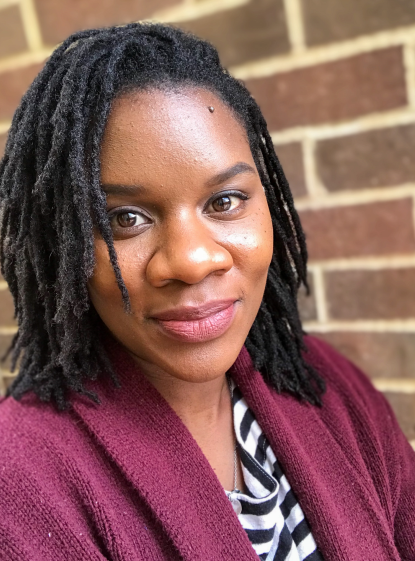Meet Omonse Talton
Research Description: I study the effects of maternal exposures such as diabetes and obesity on placental and offspring health. I am also interested in discipline-based education research.
What is your background/current position and what does it entail?

I earned my doctorate in Reproductive Physiology, followed by a postdoc, at the University of Missouri. Currently, I am an Assistant Professor of Biology at Avila University, in Kansas City, MO. Avila has a vibrant and diverse student population, and, in my position, I teach Biology, Nursing and Pre-Health courses. I conduct research with students, and I’m also involved in a number of service positions with the University.
Can you talk a little bit about yourself, where are you from? What first attracted you to the world of science? And how did you get to be in your current position?
I’m Gambian and Nigerian. I was also born in the UK for a fun twist! With a doctor and dentist as my parents, I have always been interested in science on a human health level. The idea of becoming a scientist and an academic became attractive to me during my undergrad years at Truman State University. It occurred to me for the first time that I could ask questions about the world and try to answer them for a living. During my doctoral degree and postdoc, I had the opportunity to teach Introductory Biology courses at the University of Missouri. I found teaching immensely rewarding, and started looking for opportunities to work more directly with undergrads in both my teaching and research. That’s how I ended up at Avila.
What impact has the pandemic had on your daily activities and position?
Classes, meetings and conferences have moved online which is an ongoing adjustment. It adds a layer of complexity to my position in that I have had to develop a lot of tech skills over a short amount of time. I’m also participating in more trainings than ever before.
What strategies have you adopted in order to create a new “normal” for your daily activities and position?
Firstly, I have a home office which is (largely) private. Having that dedicated space is important for my productivity and helps to compartmentalize my day. One thing I had already started doing, in preparation for a research career at a Primarily Undergraduate Institution, is looking for avenues to collect research data digitally: whether that be from hospital records, or government databases. This is not only inexpensive, but also very compatible with working remotely.
Have you gained any valuable lessons from life during the pandemic?
The biggest lesson has been the importance of adaptability. It’s a scientific bedrock that can be hard for us to live out in our individual lives; but being aware of how your environment is changing, and proactive to adapt has proven to be very important.
A second is that collaboration is essential. In any community, when we all bring our diverse strengths to the table, we do much better.
What expectations have you had to let go or remove from your daily activities and position?
I’ve really missed the one-on-one connections that grow from sitting in my office with students and colleagues. It’s a tough one to let go off, and I honestly can’t wait to have it back.
How have you stayed connected with friends and family during this time?
FaceTime and Whatsapp have been invaluable in keeping connected.
What are you most excited to do once the pandemic has cleared?
Go on holiday with my family!
What words of inspiration would you like to share with the future generation of scientists?
- Trust the process! In the early years of training, it can feel like you’ll never figure anything out, none of your experiments are workings, and everybody is smarter than you. We have an African proverb that goes, “the day you plant the seed is not the day you eat the fruit”. With perseverance, you can make it to the other side!
- Never stop learning. I alluded to an “other side” in the first point, but all that is is a confident place from which to keep growing and learning.
- The idea of a traditional path is becoming more fluid. Don’t be afraid if you have a different background or trajectory than others.

